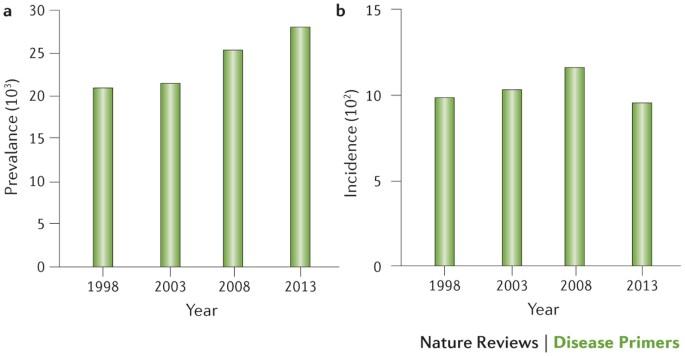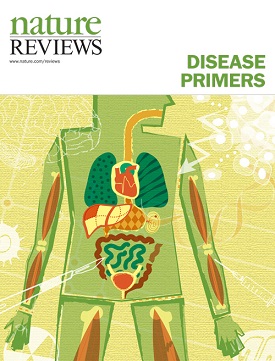Cystic fibrosis
IF 76.9
1区 医学
Q1 MEDICINE, GENERAL & INTERNAL
引用次数: 269
Abstract
Cystic fibrosis is an autosomal recessive, monogenetic disorder caused by mutations in the cystic fibrosis transmembrane conductance regulator (CFTR) gene. The gene defect was first described 25 years ago and much progress has been made since then in our understanding of how CFTR mutations cause disease and how this can be addressed therapeutically. CFTR is a transmembrane protein that transports ions across the surface of epithelial cells. CFTR dysfunction affects many organs; however, lung disease is responsible for the vast majority of morbidity and mortality in patients with cystic fibrosis. Prenatal diagnostics, newborn screening and new treatment algorithms are changing the incidence and the prevalence of the disease. Until recently, the standard of care in cystic fibrosis treatment focused on preventing and treating complications of the disease; now, novel treatment strategies directly targeting the ion channel abnormality are becoming available and it will be important to evaluate how these treatments affect disease progression and the quality of life of patients. In this Primer, we summarize the current knowledge, and provide an outlook on how cystic fibrosis clinical care and research will be affected by new knowledge and therapeutic options in the near future. For an illustrated summary of this Primer, visit: http://go.nature.com/4VrefN Cystic fibrosis is caused by mutations in cystic fibrosis transmembrane conductance regulator (CFTR), which encodes a transmembrane ion channel on epithelial cells. Here, Ratjen et al. highlight that, although CFTR dysfunction affects many organs, lung disease is responsible for the vast majority of morbidity and mortality.

囊性纤维化
囊性纤维化是一种常染色体隐性单基因遗传疾病,由囊性纤维化跨膜传导调节器(CFTR)基因突变引起。这种基因缺陷在 25 年前首次被描述,此后,我们在了解 CFTR 基因突变如何致病以及如何治疗方面取得了很大进展。CFTR 是一种跨膜蛋白,可在上皮细胞表面转运离子。CFTR 功能障碍会影响许多器官,但肺部疾病是绝大多数囊性纤维化患者发病和死亡的原因。产前诊断、新生儿筛查和新的治疗算法正在改变这种疾病的发病率和流行率。直到最近,囊性纤维化的治疗标准还集中在预防和治疗疾病并发症上;现在,直接针对离子通道异常的新型治疗策略开始出现,评估这些治疗方法对疾病进展和患者生活质量的影响非常重要。在本手册中,我们总结了当前的知识,并对囊性纤维化临床护理和研究在不久的将来将如何受到新知识和治疗方案的影响进行了展望。欲了解本手册的图解摘要,请访问:http://go.nature.com/4VrefN 囊性纤维化是由囊性纤维化跨膜传导调节因子(CFTR)突变引起的,CFTR编码上皮细胞上的跨膜离子通道。Ratjen 等人在此强调,虽然 CFTR 功能障碍会影响许多器官,但肺部疾病是绝大多数发病和死亡的原因。
本文章由计算机程序翻译,如有差异,请以英文原文为准。
求助全文
约1分钟内获得全文
求助全文
来源期刊

Nature Reviews Disease Primers
Medicine-General Medicine
CiteScore
76.70
自引率
0.20%
发文量
75
期刊介绍:
Nature Reviews Disease Primers, a part of the Nature Reviews journal portfolio, features sections on epidemiology, mechanisms, diagnosis, management, and patient quality of life. The editorial team commissions top researchers — comprising basic scientists and clinical researchers — to write the Primers, which are designed for use by early career researchers, medical students and principal investigators. Each Primer concludes with an Outlook section, highlighting future research directions. Covered medical specialties include Cardiology, Dermatology, Ear, Nose and Throat, Emergency Medicine, Endocrinology, Gastroenterology, Genetic Conditions, Gynaecology and Obstetrics, Hepatology, Haematology, Infectious Diseases, Maxillofacial and Oral Medicine, Nephrology, Neurology, Nutrition, Oncology, Ophthalmology, Orthopaedics, Psychiatry, Respiratory Medicine, Rheumatology, Sleep Medicine, and Urology.
 求助内容:
求助内容: 应助结果提醒方式:
应助结果提醒方式:


